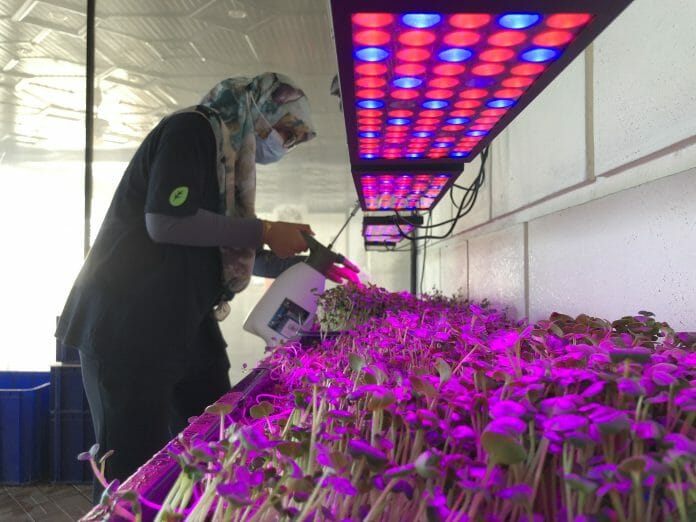By Preston Sean
With the recent increase in Delta variant cases in Malaysia, economic recovery for multiple industries continues to be at risk. This combined with the threat of worsening floods caused by climate change has heavily affected Malaysia’s agricultural productivity. With the industry still heavily reliant on traditional farming methods, the current situation is almost an ultimatum for farmers to adopt agritech solutions as quickly as possible so as to become future-proof.
Implementing Internet of Things (IoT) solutions into farming is the first step. It may sound grandiose but it simply means putting data behind the gut instincts of farmers. A smart farming system utilises IoT by collecting real-time data of elements such as the soil’s pH value, temperature, humidity and weather through remote sensors and analytical tools installed. This data can be accessed anywhere around the world through the farmers’ monitoring systems, allowing them to override the system manually if needed. By allowing farmers to make data-driven decisions when running their farms, this system elevates crop management to the next level.
Smart Farming System is Advantageous to Malaysian Farmers
With the smart farming system, farmers can schedule daily watering and fertilizing times for their crops while saving the cost of resources. This is because the amount of water and fertilizers used are regulated precisely by the IoT system which eliminates the chances of overwatering or over-fertilizing.
This has not only lowered the cost of fertiliser used per plant but is also less labour-intensive, increasing the productivity of farmers. Moreover, the system assists farmers in making sense of the collected data, giving particular attention to the pain points and requirements of each crop. This helps farmers make effective decisions and reach the maximum production of healthy crops in the quickest and smartest way possible.
Furthermore, the system will help farmers eliminate unpredictable harvest as the requirements of each plant will be properly studied and rotation of harvest will be properly planned for an all-year-round quality harvest. Before the use of IoT, it takes approximately 45 to 50 days to harvest kale. Upon implementing IoT, however, harvesting of this cruciferous vegetable can be done in just 40 days.
The Rise of Fresh Produce Consumerism and How Smart Farming Can Provide Accessibility, Quality, and Affordability
Plant-based food demands in Malaysia are growing. Especially due to the pandemic, consumers have also become more health-conscious as they acknowledge how the right food with probiotics and wellness ingredients can boost immune function. More than that, they have become concerned about sustainable practices in food production due to the growing awareness of the ecosystem.
A smart farming system can help farmers deliver accessible, affordable and quality produce that their consumers are looking for. Furthermore, with crop data stored in the cloud, the system ensures that consumers have access to the live monitoring within the farms which then creates a sense of transparency and a real farm-to-table experience.
With a controlled environment and farmers making data-driven decisions, consumers will have front row seats to nutrient-dense produce being cultivated and grown via this smart farming system. Another benefit of this technology is that contaminated food could be eradicated completely as the sensors are able to pick up any unusual chemicals and toxicity in the crops. This promises a better quality of produce for consumers.
Moreover, the system enables farmers to price their organic produce affordably because of the costs that can be saved in crop management. The quality of products will also be consistent all year round, thus eliminating seasonal produce which often causes a surplus of demand over supply leading to increases in prices. Additionally, in the long term, farmers who implement smart farming technology can do away with the mindset that fresh and organic farm produce is costly.
Data-driven Agriculture Is the Way to Go
The smart farming system is a sustainable solution. It benefits farmers, consumers and even the Earth. It does not need any use of synthetic pesticides or fertilizers and fosters more biodiversity while releasing fewer carbon emissions which would be damaging to our environment. Less use of chemicals means less pollution into rivers and drains, and the soil quality will be prevented from degradation for future generation use. Spearhead “Smart Organic Farming” and redefine a new sustainable agriculture industry for Malaysia in line with IR 4.0 must be the way forward. I think that it is crucial that we share and encourage modern sustainable practices with exciting technologies such as autonomous robotic vehicles, unmanned aerial vehicles that are developed for farming purposes and sophisticated farm management systems that enable real-time monitoring via information and communications technology (ICT).
These steps to digitize and ensure that the agriculture industry in Malaysia adopts technology will create exciting job opportunities for millennials to begin sustainable careers in agriculture and aquaculture. Data analytics, process digitization, supply and demand generators, and direct cross border e-commerce come along with modern organic farming.
A Smart Organic Farming blueprint with the identification of the correct crop for organic agriculture and aquaculture plays a crucial role in expanding the use of agritech to a commercial scale. Not only does the produce have to be economically viable, it must also be environmentally sound, socially just and productive sustainably.
Notably, the greatest challenge has yet to be upon us. The population is constantly growing and the climate is rapidly changing. It is our duty, as farmers, consumers and parties who are stakeholders in our environment, to take one step at a time towards making sustainable decisions and ensure quality living in the future as well as creating a better Earth for future generations.
By Preston Sean, Executive Director of Nutribah










